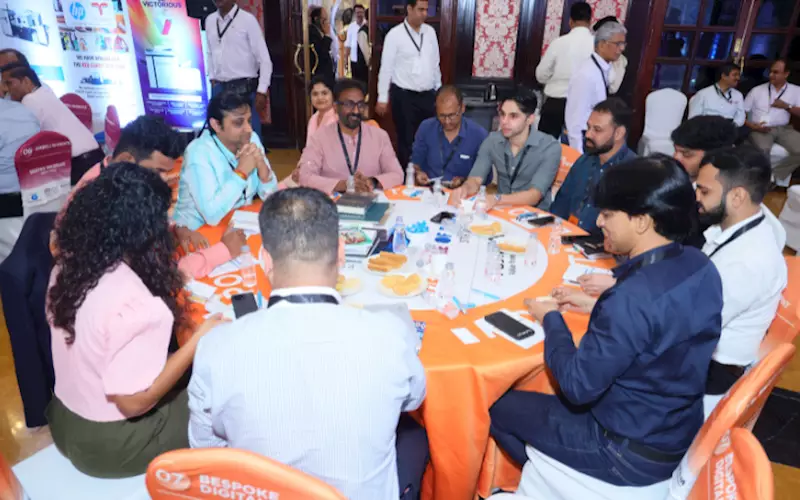MMS roundtable highlights on bespoke digital printing
Mumbai Mudrak Sangh (MMS) hosted the seventh edition of its roundtable conference on 5 April 2024 at MCA Club, BKC, Mumbai. Guided by an industrial specialist and a printing expert, eleven stalwarts convene at ‘The Circle of Print’ to discuss bespoke digital printing.
08 Apr 2024 | By Aditya Ghosalkar
Table seven sheds light on how digital printing has become vast and nuanced. Cut to the chase, the roundtable discussion began with the intricacies that follow.
Often ignored, yet a crucial parameter to consider is the press calibration. This allows consistent print production, thereby ensuring accurate colour management. All agreed that a printer must be equipped with a calibration tool, not only but necessarily, for proofing jobs.
Himanshu Pandey of Avantika Printers said, “Be it inkjet, solvent, UV, toner or liquid ink-based print engines, to utilise the machine to its full potential, a printer must ensure to calibrate it, and monitor the substrate too.”
Pandey presented a few print samples on the table, one of them was a black book weighing 3 kgs. He said, “Calibration prior to printing this book has helped me cut down the courier weight during transport by 600 gm per book.”
Dharmesh Mehta of Reliable Prints said, “One must follow the procedure to start the print by running gammas without the paper.”
In affirmation, Shridhar Khanolkar of Fujifilm India said, “This aids in bringing back the machine to manufacture or reset state.” Over time, even with consistent use of the same consumables such as ink, toner, paper, a machine is likely to give different results. Adopting the practice of calibrating helps optimise an accurate print workflow.
Pandey said, “The internal pressroom temperature is a critical factor to look after. I practise a routine of turning on the air-conditioner an hour prior to running the press. This helps me to ensure this optimisation without effect on the colour gamut otherwise.”
What else? Profiling, a term that is commonly misunderstood for calibration. This means recording a device's behaviour into a profile, which represents the device's gamut, reflected by the calibration process. On this note, Pandey shared that one must develop a habit to keep a note of the testing results for a predictable output.
Vedant Canser of National Printing Press raised a query about the challenge of achieving front-back registration in tag manufacturing. Pandey replied, “For digital, a 0.01 mm tolerance is a must to overcome this. Also, it is important to check if the issue is prevalent across varied paper types, plus the run length is another consideration.”
Well, digital has opened doors to many small-sized companies. Canser shared that an entry-level machine that costs around 20 lakh can become an additional expense for these companies.
Here, the investment is a two-way process. On one hand, a Original Equipment Manufacturer (OEM) has a single agenda: to sell the machine. Also, they possess knowledge about the machines. Hence, from the printer’s side, there must be lucid conversation to meet their own objectives.
Khanolkar emphasised the importance of following a Standard operating procedure (SOP). All agreed and also discussed a few parameters that must be sought. To which, Pandey advised, “Don’t use plastic or steel scales on your press. Instead, use a film ruler. This avoids tolerance issues. Also, a practice must be to measure paper on both sides.”
Plus, a printer must convert a print file to a PDF, and avoid shooting right away from the application. This helps to overcome changes in colours and wavelength tonality.
Overall, the RT concluded with a message: Indeed, digital printing has evolved as bespoke technology, a standalone one over the conventional methods.
Participants
- Print expert: Himanshu Pandey of Avantika Printers
- Delegates: Pritesh Chavan and Vedant Canser of National Printing Press
Dharmesh Mehta of Reliable Prints
Vishal Nimbalkar of Vishal Offset
Rashmi Ravinarayan of Trigon Digipack
Kewal Karia of Jay Raj Fine Papers
Shiva Kumar of Futura Digital
Piyush Pahalwani of Unique Printing Solutions
Shridhar Khanolkar of Fujifilm
Shardul Kharpude of Aarti Entreprises











 See All
See All